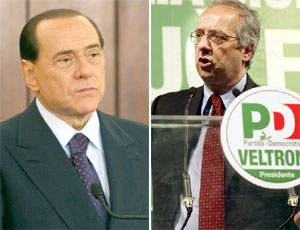An Italian Democrat in NYC
On Saturday, September 21, the leader of the largest opposition party in Italy was interviewed by Jane Kramer, New York Times Europe correspondent, and CUNY professor Michael Blim at a conference entitled “Power and Progressive Politics: Europe”.
Mr. Veltroni, a professional journalist, was deputy in Romano Prodi’s center-left government in 1996 and served mayor of Rome from 2001 and 2008. As the Democratic candidate for Prime Minister last spring, he showed his determination to fight the battle against center-right leader Silvio Berlusconi without entangling in party alliances, particularly the radical left. Veltroni regards the upcoming U.S. presidential election as a crucial moment not only for the U.S., but for progressive politics in Europe.
“The victory of Obama could mean the opening of a new season of innovation and multipolar politics in international relations,” Veltroni said. “If McCain would win, especially after the choice of his running mate Sarah Palin, the message the world would get would be more in tune with a certain populist message that brought the victory of Berlusconi’s party and other right wing parties in Europe.”
The former mayor of Rome strongly believes that a new Democratic presidency in the U.S. could reinvigorate the sluggish European Union integration and vitalize Europe’s active role in international issues.
“The E.U. started a journey but did not reach the end,” he said. “The E.U. integration process stopped in Ireland, in France and because of the red tape paralysis of Europe itself. Getting stuck in the middle of the road is the worst thing ever. You don’t have the certainty of the national state anymore and you still don’t have the United States of Europe, the goal I think we should aim at. The E.U. has to decide what it wants to be. It should become a great and cohesive reality with a common defense policy, able to answer the U.S., that especially with Obama, rightly ask for a more dynamic role of Europe in international crisis.”
As noted by both Professor Michael Brim and Jane Kramer, immigration, homeland security and the widespread fear (real and perceived) connected to these issues are some of thorniest problems in Europe, and in particular in Italy. Veltroni, while acknowledging that any crime has to be punished severely, believes that integration policies should be enforced to prevent racism from taking over.
“The Italian Democratic party has to be really clear-cut about this. Whoever is found responsible of a crime has to pay his or her debt,” Veltroni said. “But this is not enough. You need integration politics. A climate of intolerance against every kind of diversity is taking over in Europe and Italy. A number of European nationalist parties, including neo-Nazi ones, Saturday had a meeting in Germany -- officially to refuse the building of a mosque -- but beyond that lies the narrow idea that your world is just your home. Three terrible cases of racism recently took place in Italy. A black guy was beaten to death few days ago in Milan -- the prime minister said that there is no racist aspect in this killing, but the person that was beating him up was saying “dirty nigger”; two gay guys were attacked in Rome by a group of skinheads; and in a mafia slaughter six Nigerians were killed in Caserta near Naples last Saturday.”
Jane Kramer suggested that part of the way Italians see immigrants is due to the way the Italian media represents them, often misinterpreting reality and fueling fears.
“Really only one major newspaper, La Repubblica, is still detached from Berlusconi’s influence,” Kramer said. “You have a contestatory press that is almost nonexistent in a country where the press has always tended toward partisanship.”
According to Mr. Veltroni, certain mass media and political parties play the fear card to appeal to mass audiences, but he reckons this type of game is a risky one.
“A mix of fears, both real and virtual, from terrorism, a real one, to the mad cow disease, from the millennium bug to environmental threats, made the public opinion very fragile,” Veltroni said. “Political parties, like news organizations, use fear, seeing it as the most expendable good to get votes. Visiting a factory and suggesting workers to be afraid of immigrants because they are going to take their jobs away is the easies thing to do. But when election time is over you have to govern a society, and you need to create a situation where people can live together.”
In conclusion, Veltroni reminded the audience, mainly made up of CUNY graduate students, that at the end of the day Italy is a country of immigrants.
“Oh well,” he said, laughing, “I don’t need to mention it here in New York. Italians crossed the ocean to offer their will to work and their intelligence. And of course, now and again, we caused a few problems.”





































i-Italy
Facebook
Google+
This work may not be reproduced, in whole or in part, without prior written permission.
Questo lavoro non può essere riprodotto, in tutto o in parte, senza permesso scritto.